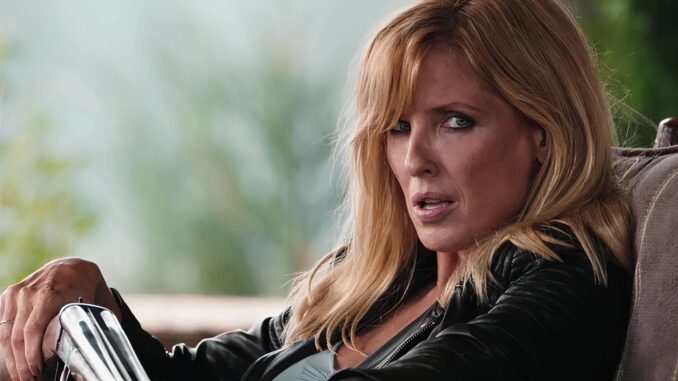
The Montana wind, a constant, unseen narrator, whispers through the skeletal branches of winter-bitten pines. It carries the scent of pine, snow, and something else – the lingering musk of blood and burning ambition. This is the stage for the Yellowstone universe, a sprawling, violent epic of land, loyalty, and the relentless fight to preserve a vanishing way of life. And if ever there were a duo forged in the crucible of that world to carry its raw, beating heart forward, it is Beth Dutton and Rip Wheeler. Their love, a beautiful, dangerous wildfire, burns brightest in the darkest corners. A spinoff centered on them, post-John Dutton, post-final battle, feels not just inevitable, but essential.
Imagine it: the Dutton Ranch, or what remains of it, a starker, more brutal beauty under Beth’s reluctant, iron-fisted rule. The political maneuvering and corporate machinations of Helena and Market Equities are largely gone, replaced by a more primal struggle. Beth, now truly unburdened by her father's shadow, is the feral queen of her domain, her sharp wit a poisoned arrow, her loyalty a steel trap. Rip, her immovable object, her quiet storm, is the enforcer, the anchor, the man whose moral compass points solely to Beth. Their nights are whiskey-soaked and intense, their days a relentless grind of maintaining a legacy that threatens to consume them. The spin-off would delve deeper into their unique brand of justice – an eye for an eye, a tooth for a tooth, but with a surprising, tender vulnerability revealed only to each other. Their narrative would be less about saving an empire and more about building a sanctuary, albeit one perpetually under siege, a testament to the idea that love, even born of violence, can be a fortress.
Then, the earthquake. The addition of Ed Harris to this volatile tableau. He doesn't arrive as a city slicker with a briefcase, nor as a rival rancher brandishing deeds. He appears, as if a ghost whispered into being by the Montana wind itself, as a ranch hand. An old cowboy, weathered and silent, with eyes like chipped flint that hold centuries of unspoken stories. He simply… walks onto the ranch, hat pulled low, asking for work. Beth, ever suspicious, would grill him with her usual vitriol, but find nothing to latch onto. Rip, with his instinct for predators and kin, would sense something profound, something ancient, but undefinable.
Ed Harris, in his inimitable fashion, would embody a different kind of "old West." Not the romanticized, but the forgotten. He isn't a modern threat; he's a living artifact, a specter of the land's deepest, darkest history. His character, perhaps named Silas or Elias, wouldn't speak much, but when he does, his words would carry the weight of prophecy and hard-earned wisdom. He'd move with an economy of motion that belies a coiled strength, a quiet authority that challenges even Rip's dominance.
His presence wouldn't be about direct conflict in the Yellowstone vein of property disputes. Instead, he would become a mirror, a catalyst. For Beth, he might represent the untamed wilderness she so desperately tries to control within herself, a silent challenge to her carefully constructed chaos. He sees her, truly sees her, not as John Dutton's daughter or Rip's wife, but as the force of nature she is. Their scenes together would be a masterclass in unspoken tension: intellectual sparring, philosophical clashes delivered through pointed silences and the cutting edge of a glance. He might subtly guide her, not with advice, but by revealing truths about the land, about loyalty, about the cost of living by your own rules, truths that resonate deep within Beth’s outlaw soul.
For Rip, Ed Harris's character would be a different kind of test. Rip, the ultimate loyalist, the enforcer of John's code, would find his understanding of "the code" challenged by Silas’s older, more elemental law. Silas might represent a justice predating brandings and barbed wire, a primal reckoning with the land and its demands. He could be a forgotten member of the ranch's original crew, someone who saw the Duttons rise, fall, and rise again, and understands the cyclical nature of power and loss better than anyone. He might be the keeper of a dark secret tied to the ranch's very foundations, a truth that could shake Beth and Rip's claim to the land, or, paradoxically, solidify it through a new understanding.
The illustrative power of casting Ed Harris lies in his ability to imbue a character with such profound gravitas and ambiguity. He’s not a villain in the traditional sense, but a force. He doesn't scheme; he observes. He doesn't threaten with words; his very presence is a challenge. He forces Beth and Rip to look inward, to question their assumptions, to confront the spiritual debt the Duttons owe the land and its original inhabitants. He makes them understand that the fight for Yellowstone isn't just against greedy corporations, but against time, against the wildness within, and against the ancient spirits of the land itself.
A Beth and Rip spinoff, with Ed Harris as a quiet, formidable presence on the Dutton Ranch, wouldn't just be a continuation; it would be an evolution. It would strip away the political veneer and dive into the raw, beating heart of the Yellowstone mythos: the eternal struggle between civilization and wilderness, loyalty and betrayal, love and the brutal cost of protecting it. It would be a poetic, visceral, and utterly unforgettable ride into the true soul of the West.
